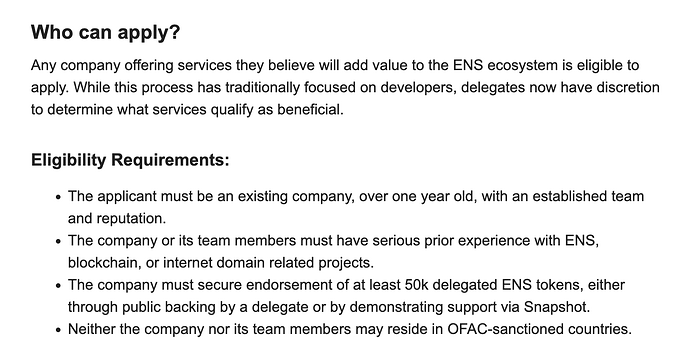I’m excited to see the service provider program being renewed for another year. In its first year, it’s already funded some outstanding providers who have delivered real, meaningful improvements to ENS and the DAO.
At times I’ve seen some confusion and disagreement around the purpose of the service provider program. While my opinion here is purely my own, I think it lines up well with Alex’s vision, and so I thought it might be useful to share it here so others can add their two cents as well.
The most essential attribute of a service provider is right there in the name - they are providing a service to the DAO. The program does not exist to fund arbitrary public goods, or as seed funding for a venture - it’s designed to offer payment in return for a service. Providers put forward a proposal stating what they can do and what it will costs, and the DAO, through its delegates, decides if that is a service the DAO needs, and if the cost is reasonable.
Implicit in that is that the service on offer must be something the DAO needs or wants.
So, what does the DAO need? In my mind there are three broad categories:
- ENS infrastructure: Anything that improves ENS as a whole. This includes development work on smart contracts, frontends, libraries, etc that increase the usefulness or scope of ENS. The majority providers in the first program round focused on this, and it’s where I hope the majority of service provider program funding will go this year as well.
- Outreach and integrations: Efforts to increase the adoption and usage of ENS, such as integration support for wallets, DApps and exchanges, marketing efforts, or other related initiatives.
- DAO infrastructure: Anything that improves the operation and smooth running of the DAO. This includes improvements and automation of the DAO’s processes, voting frontends, tools for transparency and accountability, communication tools, etc. Many things in this category will result in producing public goods that are useful to other DAOs as well, which is great - as long as the funding is used first and foremost to build something that the DAO needs and wants.
If your project, however noteworthy, doesn’t fit into these categories, please consider applying to the public goods working group for funding instead. We’re not trying to fund all of Web3 here; even if your project integrates ENS at its very heart, the service provider program exists to build ENS - not the whole ecosystem of products that use or integrate it. The DAO simply isn’t big enough to fund every worthwhile project that uses ENS; we need to focus first and foremost on building ENS itself.
Finally, a note about duplication: Last year we had several providers, all individually credible, who were proposing to build essentially the same thing. As a delegate, if you see this happening, consider choosing the candidate most likely to succeed and campaigning for them with other delegates - even if you think there are multiple good options. As a prospective service provider, look at other proposals and consider how best to differentiate yourself. Unfortunately, due to the nature of ranked choice voting, even with best intentions all around the DAO may end up appointing multiple parties to do the same thing, but we can at least strive to minimize duplicated efforts.
